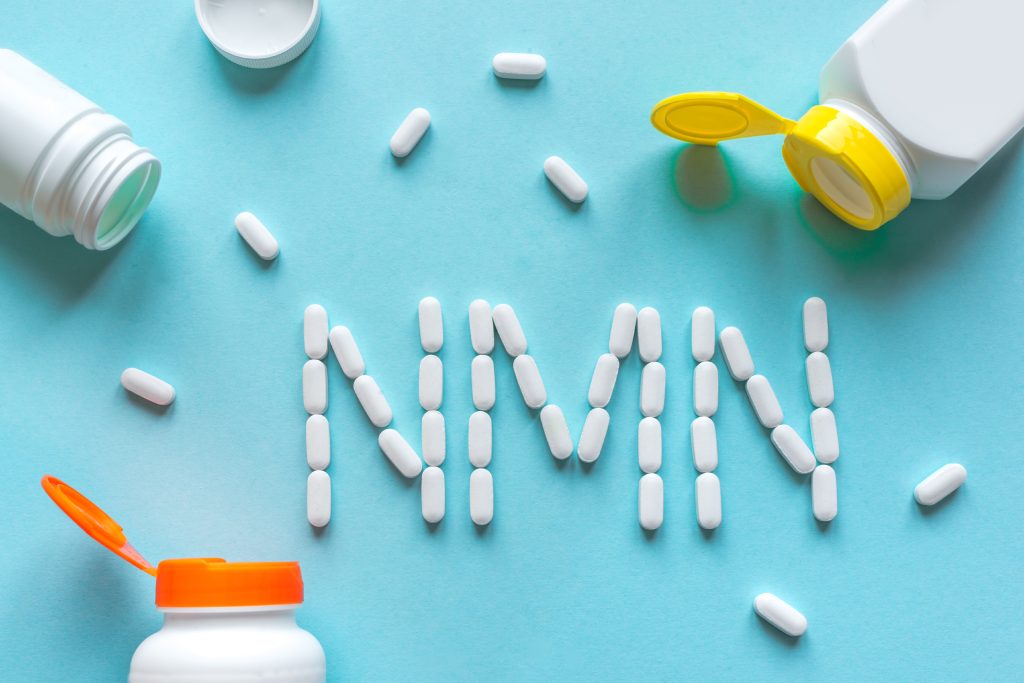Can’t Build Muscle? Discover How to Grow Your Muscle Twice As Fast with NAD

You’ve been hitting the gym regularly, lifting heavier weights, and pushing yourself to the limit.
You’ve tried various workout routines, followed strict diets, and even taken supplements.
But despite all your efforts, the muscle gains are minimal. It’s frustrating, and you’re starting to wonder if you’re ever going to achieve your muscle goals.
This struggle is all too common.
Many gym-goers and bodybuilders face the same issue, feeling stuck despite their hard work and dedication.
The truth is, that building muscle is a complex process influenced by various factors, and understanding these can help you break through the plateau.
Fortunately, by optimizing your NAD levels, you can boost muscle gains and increase energy, just like Emily Paye, who had the vitality to play basketball, do cardio, and hit the gym regularly.
“I’m almost done with my first jar and I can’t believe how my energy levels have improved. I’m finding myself smiling more often and feeling overall much more relaxed.
My boyfriend’s nieces and nephew roped me into playing a basketball game with them over Christmas and despite having done no cardio or regular workout sessions for a few years now, I had plenty of energy even after running back and forth across the gym for probably a solid half hour before the kids finally got bored.
The energy improvement is very tangible. The mood improvement is subtle but still noteworthy.“
The question is: what’s stopping you from achieving maximum muscle gains?
5 Reasons Why You Struggle to Build Muscle

Inadequate Nutrition
Building muscle requires more than just intense workouts; it demands proper nutrition to provide your muscles with the essential building blocks and energy they need to grow.
Without adequate protein and calories, your muscle gains will be limited, no matter how hard you train.
- Protein Intake: Your muscles need protein to grow, and if you’re not consuming enough, your gains will be limited. Protein is essential for repairing and building new muscle tissue. Without sufficient protein, your muscles won’t have the necessary building blocks to grow.
- Caloric Deficit: Being in a caloric deficit for too long can hinder muscle growth since your body lacks the energy it needs to build muscle.
While cutting calories might help you lose fat, it can also deprive your muscles of the fuel they need to grow. Ensuring you consume enough calories, especially from protein and healthy fats, is crucial for muscle growth.
Poor Workout Routine
Even with regular gym visits, without a strategic workout routine, your muscle gains may stall.
To stimulate growth, it’s essential to progressively increase the intensity and allow adequate recovery time to prevent overtraining.
- Lack of Progression: If you’re not progressively increasing the weights or intensity of your workouts, your muscles won’t have the stimulus they need to grow. Progressive overload is key to muscle growth; without it, your muscles adapt to the current load and stop growing.
- Overtraining: Training too often without adequate rest can lead to muscle fatigue and hinder growth. Overtraining can cause your muscles to break down faster than they can repair and grow. Balancing your workout intensity with sufficient rest is essential to prevent overtraining and promote muscle growth.
Insufficient Recovery
Proper muscle growth isn’t just about what happens in the gym—recovery is equally important.
Without adequate sleep and rest days, your muscles don’t get the chance to repair and grow, hindering your progress.
- Sleep: Muscles repair and grow during sleep. Not getting enough quality sleep can disrupt this process. Sleep is when your body releases growth hormones, which are critical for muscle repair and growth. Make sure you get 7-9 hours of quality sleep each night to boost your muscle gains.
- Rest Days: Your muscles need time to recover between workouts. Skipping rest days can impede growth. Rest days are as important as workout days because they allow your muscles to repair and grow. Incorporating proper rest into your routine helps prevent injury and promotes muscle growth.
Hormonal Imbalances
Hormones play a crucial role in muscle growth, and imbalances can significantly impact your progress.
Low testosterone and high cortisol levels can make it challenging to build muscle, thus, it’s important to maintain hormonal health through proper diet, exercise, and stress management.
- Testosterone Levels: Low testosterone can make it difficult to build muscle. Testosterone is a key hormone for muscle growth, and low levels can hinder your progress. Make sure to maintain healthy testosterone levels through diet and exercise can support your muscle-building efforts.
- Cortisol Levels: High cortisol levels from stress can break down muscle tissue. Cortisol, known as the stress hormone, can negatively impact muscle growth by breaking down muscle tissue for energy. Managing stress through relaxation techniques, adequate sleep, and proper nutrition can help maintain healthy cortisol levels.
Low NAD Levels
NAD (Nicotinamide Adenine Dinucleotide) is essential for energy production and muscle recovery.
Low NAD levels can hinder your ability to perform intense workouts and slow down muscle growth, making it a crucial factor to address for optimal muscle gains.
- Energy Production: NAD (Nicotinamide Adenine Dinucleotide) is crucial for converting nutrients into energy, which your muscles need to perform and grow. Without adequate NAD, your muscles may not have enough energy to sustain intense workouts, leading to reduced performance and slower muscle growth.
- Muscle Recovery: Low NAD levels can impair your muscles’ ability to recover and grow after workouts. NAD is essential for repairing muscle cells and facilitating their growth. Boosting your NAD levels can enhance your muscle recovery process, allowing you to train more effectively and see better results.
5 Ways NAD Can Help You Grow Muscle

Enhanced Energy Production
NAD helps convert your food into usable energy, ensuring your muscles have the fuel they need for intense workouts and growth.
By improving energy production at the cellular level, NAD enables you to train harder and longer, pushing your muscles to grow.
This is because of NAD’s role in the mitochondrial electron transport chain, where it acts as a coenzyme in redox reactions.
This process is crucial for ATP production, the main energy currency of the cell.
A study published in Molecular Metabolism found that boosting NAD levels can enhance mitochondrial function, leading to increased energy production and improved physical performance.
Improved Muscle Recovery
By boosting NAD levels, you can speed up muscle recovery, allowing you to train harder and more frequently.
Faster recovery means less downtime between workouts, which can lead to more consistent muscle growth over time.
NAD also plays a vital role in the activation of sirtuins, a family of proteins that regulate cellular health and stress resistance.
Sirtuins, particularly SIRT1, help repair muscle tissue by enhancing mitochondrial biogenesis and reducing inflammation.
Research in the Journal of Cell Science highlights that higher NAD levels facilitate better repair mechanisms in muscle cells, promoting quicker recovery and enhanced muscle regeneration.
Reduced Muscle Fatigue
Higher NAD levels can decrease muscle fatigue, enabling you to maintain peak performance throughout your workouts.
You can lift heavier weights and perform more reps with reduced fatigue, stimulating greater muscle growth.
NAD is involved in the regulation of oxidative stress and maintaining the redox balance within muscle cells.
By reducing oxidative damage and supporting antioxidant defenses, NAD helps preserve muscle function and delay the onset of fatigue.
A Journal of Applied Physiology study demonstrated that increased NAD availability reduces muscle fatigue and improves endurance during high-intensity exercise.
Increased Protein Synthesis
NAD plays a role in protein synthesis, the process by which your body builds new muscle tissue.
By enhancing protein synthesis, NAD helps your body efficiently use the protein you consume to repair and grow muscle fibers.
NAD influences protein synthesis through its effect on the mTOR pathway, a key regulator of cell growth and protein metabolism.
Activation of mTOR signaling by NAD promotes the translation of muscle proteins, leading to increased muscle mass.
According to a study in Nature Communications, NAD positively influences protein synthesis pathways, resulting in greater muscle protein accumulation and growth.
Support for Cellular Health
NAD supports the health and function of your cells, including muscle cells, promoting overall muscle growth and strength.
Healthy cells are more efficient at performing their functions, including energy production and muscle repair, leading to better muscle growth.
NAD is essential for maintaining genomic stability and activating DNA repair enzymes such as PARPs (Poly (ADP-ribose) polymerases).
By supporting these cellular processes, NAD helps prevent muscle cell damage and promotes longevity.
Research published in the Journal of Skeletal Muscle has shown that maintaining adequate NAD levels is crucial for cellular health, which directly impacts muscle function and growth.
Imagine seeing twice the muscle growth from the same effort you’re putting in now. With NAD, it’s possible.
By boosting your NAD levels, you can overcome the plateaus and frustrations that have been holding you back.
Three Ways to Unlock Your Muscle-Building Potential with NAD

Step 1: Order the Intracellular NAD test today.
Order the Intracellular NAD test today and use it as soon as it arrives. This test can help you determine if you are deficient in NAD, assess the effectiveness of your NAD supplement, and find the optimal dosage for your needs.
Additionally, the test provides actionable data to help you adjust the dosage of Creatine +, optimizing your NAD levels and helping you boost your muscle gains
⇒ Buy Intracellular NAD® Test here.
Step 2: Take Vitality Boost
When it comes to building muscles, there’s nothing quite like Vitality Boost.
This supplement is meticulously formulated to provide a potent blend of natural ingredients that work synergistically to enhance your vitality and help build your muscles and strength.
It is a clinically validated formulation consisting of NAD precursor, Creatine monohydrate, D-Ribose, and Nicotinamide that work synergistically to help:
- Manage fatigue
- Boost energy and improve performance
- Improve sleep quality
- Support inflammation, muscle, and joint pains
- And more.
Step 3: Take Creatine +
If you want to boost your energy, recover from your training fast, and grow your muscles twice as fast, Jinfiniti’s Creatine+ can help.
With Creatine+, you can expect to experience…
A burst of energy to help you complete your workouts and stay energized throughout the day.
While creatine offers energy, Creatine+ also contains ATP, which is essential for muscle energy production and can enhance your performance even further. Other products on the market typically offer only one of these key energy components.
Faster progress in muscle growth and strength development.
Creatine+ is designed to support and enhance your body’s natural muscle-building processes, helping you achieve your fitness goals more efficiently.
Faster recovery from your workouts than ever before.
While aches and pains after exercise are normal, Creatine+ can help reduce these discomforts, allowing you to recover quickly and get back to your training with minimal downtime.
Building muscle not only improves your physical appearance but also contributes to your overall health and longevity.
Maintaining muscle mass can help you avoid injuries and common issues associated with muscle loss, bone density reduction, and strength decline as you age. Creatine+ supports your muscle health, helping you live a healthier, more active life.
Start your journey to bigger, stronger muscles today with the power of NAD.
Elevate your workouts, recover faster, and achieve the muscle growth you’ve always dreamed of.
Our Money-Back Guarantee
If our Vitality Boost fails to increase your NAD levels and Creatine+ does not boost your energy, just send us a message within 60 days and we will gladly refund your supplement purchase.
Please note that tests are non-refundable.








































